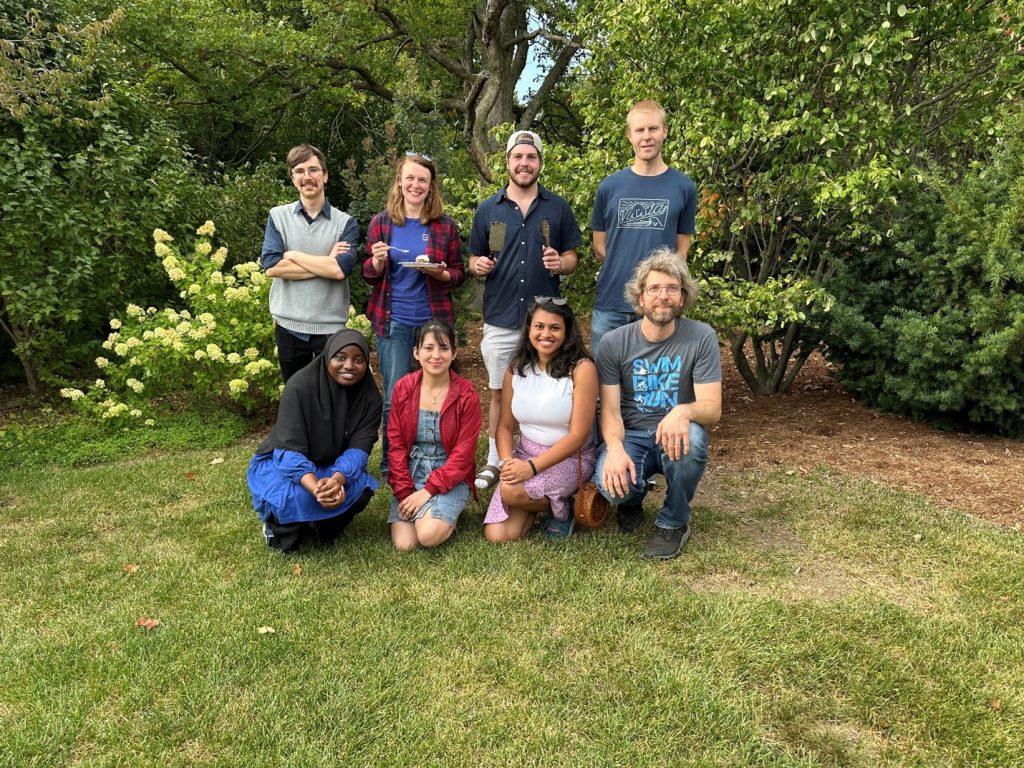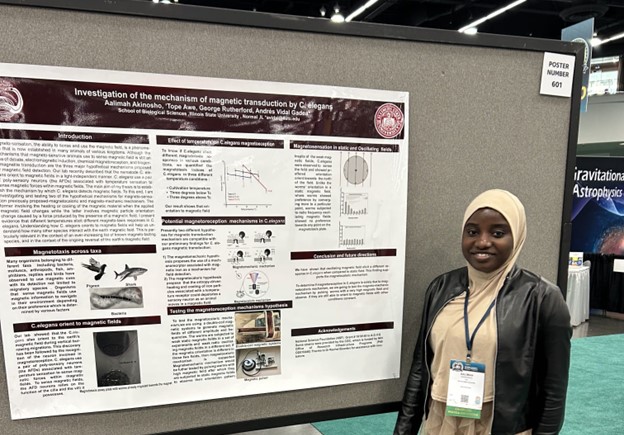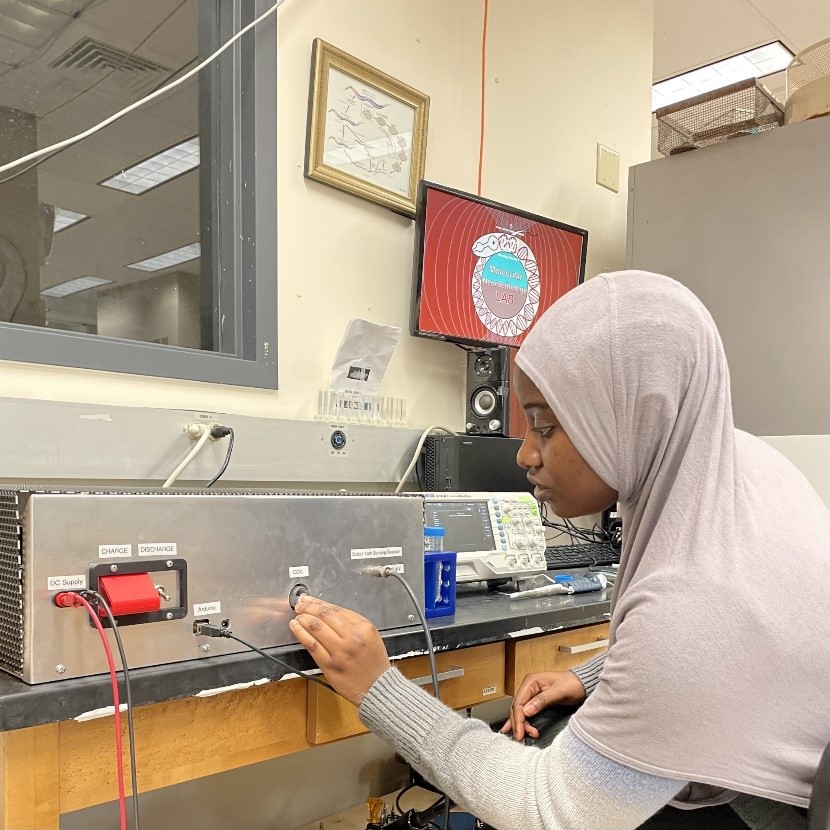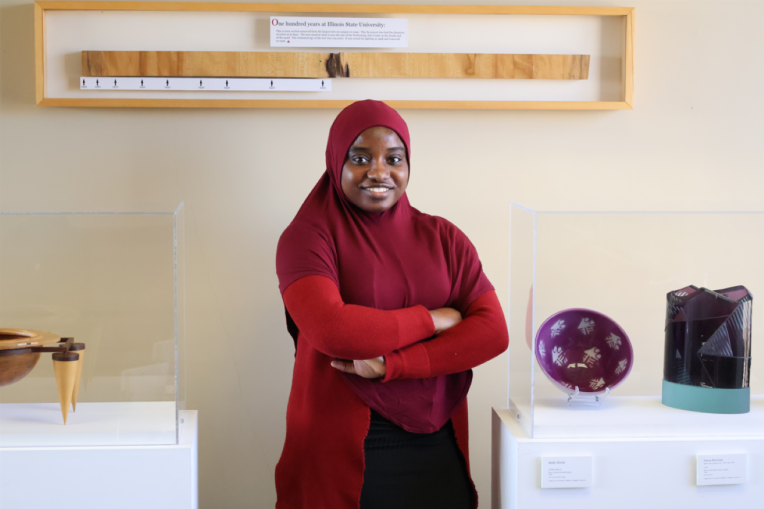The Graduate School has selected Aalimah Akinosho as its February 2024 GradBird Scholar recipient. GradBird Scholar is an initiative to recognize graduate students for their scholarly endeavors at Illinois State University.
Akinosho is an international student from Nigeria, where she obtained her bachelor’s degree in human anatomy. In the final year of her undergraduate studies, she was introduced to research in neuroscience and decided to pursue her degree at Illinois State. Her favorite hobbies include reading happy novels, traveling with friends and family, and spending her alone time signing.
What is your favorite part of your program?
I like that the Biological Sciences Department isn’t just a place of academic pursuit; it’s a nurturing community where relationships are forged and personal growth is encouraged. My colleagues are my friends and my committee is always there for me. It feels like there’s an unspoken agreement among faculty and students that we’re all in this journey together. I am particularly grateful for how our instructors tailor their teaching methods to accommodate our individual needs by creating inclusive learning environments; they prioritize our growth as individuals. It’s this personalized approach that empowers us to strive for excellence and become the best versions of ourselves.
Do you work with a specific faculty/staff member to help with your research? What has your experience been like working with them?
I have been fortunate to work with many resourceful professors. As a biology research assistant, I primarily work in Dr. Andres Vidal-Gadea’s laboratory, the worm lab. Dr. Vidal-Gadea is my supervisor and committee chair. He has continuously guided and encouraged me by bringing up thought-provoking ideas and ensuring the overall efficiency of my project. I have also had the privilege of working with Dr. Wolfgang Stein and Dr. Rosa Epaminondas who are both members of my committee. Their guidance, feedback, and input is immense. The list of supportive faculty members would not be complete without me mentioning Dr. George Rutherford from the Physics Department. Dr. Rutherford has been an amazing resource for my research as he tirelessly helped in building a device, and without it my research would not be complete.
Can you explain your research and the importance of it within your field?
Magnetic sensation, which is the ability of certain animals to feel, respond and use the Earth’s magnetic field, remains an unresolved concept in sensory biology. This is because it challenges the conventional understanding of sensations in living organisms. The magnetic field is produced by the Earth and is crucial for all life on Earth. However, to fully understand our biosystem, it is important to understand how mechanisms like magnetic sensation work in animals that use them. Using roundworms (C. elegans) as the model organism, I want to show how the nervous systems of animals sense magnetic fields. In all animals, information must be translated into electrical signals for it to be perceived by the sense organs throughout the nervous system. This is called neuronal transduction. Unlike touch, sight, and so forth, magnetic sensation (the ability to sense the Earth’s magnetic field) is pronounced in nonhuman animals. With numerous evidence demonstrating that animals across different kingdoms can sense the Earth’s magnetic field, it is important to understand the basis of how they sense magnetic fields. Based on the behaviors observed in different organisms, there are hypotheses on how magnetic sensation can occur in the nervous system of roundworms. I am testing these through a series of experiments. In these experiments, I am preventing a crucial mechanism of each hypothesis from happening to see if roundworms can still sense magnetic fields. If they can, then the hypothesis tested is not the one used by roundworms. By doing this for all hypotheses suggested, I will be able to determine which hypothesis best explains how magnetic sensation occurs in roundworms. Understanding magnetic transduction holds the potential to reshape our understanding of the interconnectedness of life on Earth and further explain biodiversity. The Earth’s magnetic field is a silent hero that has protected us from harmful solar radiation and cosmic particles. It is constantly subjected to alterations due to human activities like urbanization and electromagnetic pollution. Our inability to understand how magnetic transduction occurs and its benefits in living organisms contributes to our limited efforts toward conservation and minimizing human impacts on natural habitats. Investigating magnetic transduction might lead to discoveries with implications for human health. The use of a naturally occurring process to design artificial medical aids is not new in science. Understanding how magnetic transduction occurs can potentially inspire the development of bio-inspired sensors and navigation systems, leading to technological advancements in various fields. Furthermore, many migratory animals use the Earth’s magnetic field for long-distance navigation. Understanding their magnetic sensing mechanisms can help us comprehend the unique feats of migration, thereby contributing to our knowledge of ecosystem. This is particularly relevant in the context of the ongoing reversal of the Earth’s magnetic field.



Why do you enjoy researching this topic? And what more do you hope to learn about it?
Researching magnetic sensation in C. elegans is fascinating for several reasons. Firstly, understanding how these tiny roundworms perceive and respond to magnetic fields could provide insights into fundamental biological processes and sensory mechanisms. It’s intriguing to explore how such simple organisms orient and interact with their environment using this sense. Moreover, studying magnetic sensation in C. elegans offers an opportunity to contribute to our understanding of magnetoreception across species. By uncovering the molecular and neural mechanisms underlying this ability in a genetically tractable model organism like C. elegans, we may gain valuable insights that could be applicable to other organisms, including humans.
Personally, I find the interdisciplinary nature of this research captivating. It involves elements of genetics, neuroscience, biophysics, and behavior, which makes it a rich and dynamic field of study. Additionally, the potential applications of this research extend beyond basic science to fields such as animal behavior, neurobiology, and even technology, making it highly relevant and impactful.
What do you hope further research about this topic will do to benefit the greater of society?
I hope that my thesis would help advance our understanding of biology, inspire technological innovations, and contribute to efforts aimed at improving human health and preserving the natural world.
Would you like to highlight anything else about your research or promote anything specific you are involved in?
I would like to mention that magnetic sensation as a niche in sensory biology is one that is challenging and tedious as it encompasses going outside a biologist comfort zone into areas such as physics. That being said, I would like to appreciate every scientist working to decipher this concept, from myself, my lab mates, my advisors, my committee members, to the biologists and the physicists that have taken up the Herculean task of figuring this out. I would also like to encourage my fellow biologists to recognize this niche area of sensory biology as equally important to any other.

